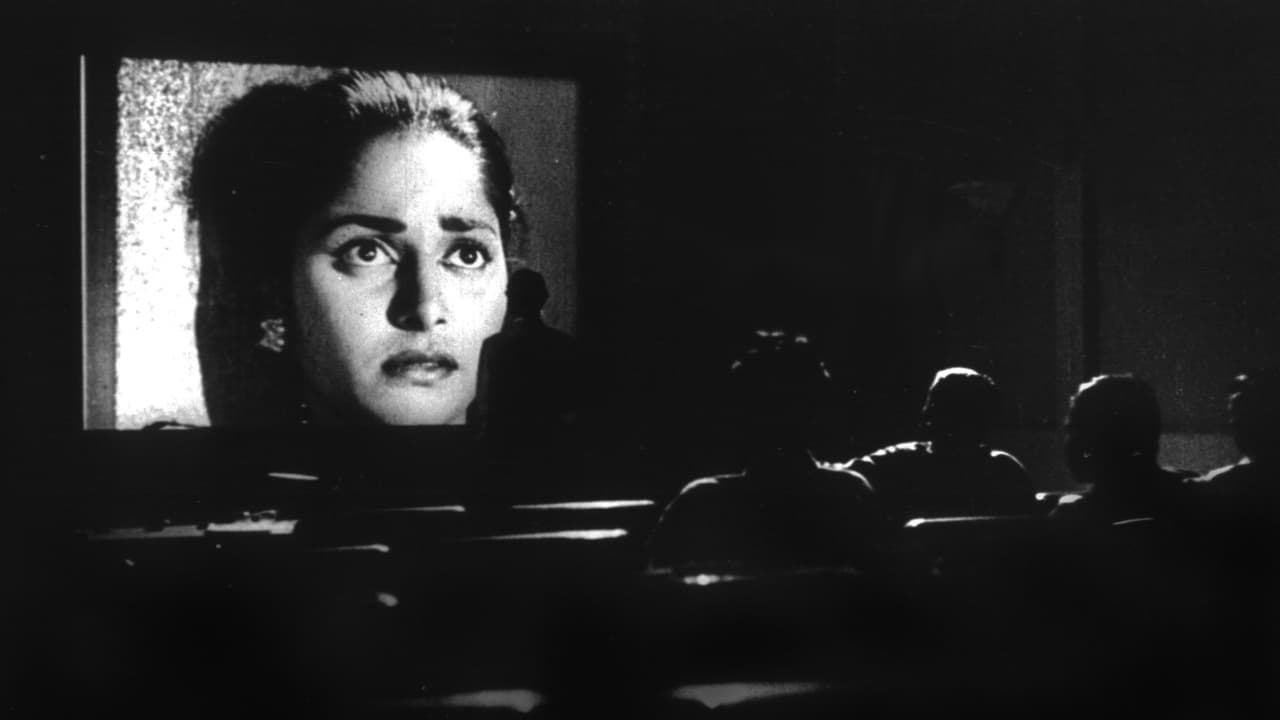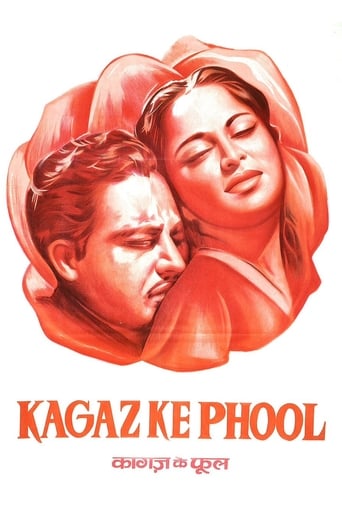

Admirable film.
... View MoreA Disappointing Continuation
... View Morean ambitious but ultimately ineffective debut endeavor.
... View MoreThe movie's neither hopeful in contrived ways, nor hopeless in different contrived ways. Somehow it manages to be wonderful
... View MoreThis is one of the best Hindi movie from 1960s. Good direction and story, wonderful acting by Guru Dutt & Waheeda Rehman.
... View MoreKaghaz ke phool ~ Dutt's Paper FLowers Is Pure Gold ... Guru Dutt, the troubled genius who committed suicide in 1964 at the age of 39 is a legend in India but little known outside of the subcontinent. In several other films films Dutt as actor/director played a semi-loser from the wrong side of the tracks who finally wins out against all odds to get the hand of a beautiful woman, but In "KAGAZ KE PHOOL" ("Paper Flowers") , now generally regarded as Dutt's masterpiece, he plays the role of a gigantic loser, a famous film director --something like a Bombay Cecil B. DeMille -- who junks his career and loses the great love of his life due to his own self-destructive tendencies, falling all the way to the bottom in a morbid tale with many echoes of Orson Welles' "Citizen Kane". The parallels with Kane" are more in the feeling, the overarching tragedy of the film told in flashback, and in certain visuals (eg. Shafts of heavenly light falling upon figures in a darkened room) than the actual story line, but also in Dutt's restrained flamboyance and versatility as an actor. Just as nobody but Welles could have been Kane, nobody but Dutt could have been "Suresh Sinha" the star director of Paper Flowers. In the film within the film Sinha is directing the famous Indian tragedy "Devdas", itself the story of a precipitous alcoholic fall from grace by a self-destructive lover. Everything is set when the actress for the key role of the heroine "Paro" drops out. In a driving rainstorm at a bus stop Suresh offers his coat to a drenched young lady (Waheeda Rehman) who turns up a few days later on the set to return the coat and inadvertently walks across the set while shooting is in progress. Viewing the rushes of this accidental exposure Suresh has an epiphany and realizes that he has found his Paro. He has also found a fantastic beauty who will soon outshine him with her own light -- exactly what happened in real life when the actress Waheeda Rehman, discovered by Dutt, went on to become a superstar as Dutt's own career plummeted in the wake of their shattered love affair. Much of what was actually going on in Dutt's private life is woven into the fabric of the film as it practically prophecies his own doom five years later. Dutt was evidently a driven and bedeviled man when Paper Flowers was being made and his personal pain pervades the picture, which was a great box office flop when it came out despite its compelling star power. (Note: Kane was also not a hit when it came out, although it is now regularly cited as "The greatest motion picture ever made"). The commercial failure of the film so discouraged Dutt that he stopped directing although he continued to appear as an actor in other films, notably "Sahib, Bibi, aur Gulam" (Master, Wife, and Slave), which was a big hit and won all kinds of awards in1963 including a Best Actor nomination for Dutt himself in the role of the servant in love with his master's wife.As for "Paper Flowers" which has finally found its place in the pantheon of great Indian films, Philip Lutgendorf, of the University of Iowa sums it all up in his extensive review as follows: "Flaws and all, KAAGAZ KE PHOOL deserves to rank-with Fellini's '8 and a Half'. among the all-time great films about filmmaking and life".
... View MoreReading some of the reviews makes me think that this film needs more context for an American audience and may not be fully appreciated if it is the first classic Bollywood movie one watches, but if you are interested in classic cinema (not just classic Bollywood) it really must be seen.Yes, Sinha's wife and her family are caricatures, yes Rocky's character is ridiculous, yes the beginning and end are melodramatic (no more so than many other classics, though), but everything else is artistry. Sinha and Shanti both have excellent, minimalist dialogue and express themselves well through body language and facial expression without becoming caricatures themselves. Maybe I'm reading too much into it but I think perhaps the contrast between the flat portrayal of the anti-film characters and the realistic portrayal of the main characters is more than just an attempt to please the audience and is rather an attempt to focus on the true drama. As if to say, yes, the protagonists are suffering because of these problems, but it is their suffering that we want you to look at, not the situation that caused it.The technical quality of the prints available (both picture and audio) are somewhat poor at times but for me this did not detract from my experience. I can see why it was a failure in the box office at the time. It wasn't the type of story the mass market generally wants, and especially not at the time it was made, but it is also clear why it is now considered a masterwork.
... View MoreWhy is Guru Dutt hailed as one of the all time best directors in the world? See this film and you'll get an answer. Guru Dutt never got his due from the audience or the critics when he was alive. After he died, he was suddenly hailed as this best thing to have happened to Hindi film industry. And today, he is universally regarded as one of the best Hindi film directors. This film too is resplendent with that same irony, hypocrisy and tragedy. There are films and then there is this. 'Kaagaz Ke Phool' is Guru Dutt's extremely personal and almost poetic take on the trials and tribulations of a life of fame and glamor; and especially the aftermath of it. Guru Dutt plays a successful director Ajay Sinha who is looking for a new face to cast as the leading lady in his next film. In the midst of all this, he has a strained marriage wherein his wife leaves him to live with her parents along with their daughter. On a certain rainy day, he meets a girl (Waheeda Rehman). They meet again in the studio. Immediately,Guru Dutt realizes that Waheeda's is THE face he had been looking for and promptly casts her in his next film. Eventually he falls in love ith her but she doesn't reciprocate. Meanwhile, he isn't allowed to eet his beloved daughter too through a court order. As a last straw, his next film is a colossal failure and he suddenly finds that the ones who pretended to be his well-wishers and friends now seem to hate and ignore him. Thus Waheeda, his discovery, goes on to become a successful star while he begins his downward spiral into the deep darkness of ignominy. Subsequently and ironically, after many years, he dies on the same director's chair It is not a perfect film by any means. The screenplay is sometimes indulgent and probably isn't as good as say Guru Dutt's 'Pyaasa' (his other classic). Plus, the whole track involving Johnny Walker is somewhat irrelevant to the film and hence could have been shortened. However, it was incidentally, India's first film to be shot in Cinemascope and hence makes good use of technique but essentially KPK remains a very humane film which moves us without being preachy or overtly sentimental. SD Burman's haunting music and Kaifi Azmi's poignant lyrics add to the mood of this filmIronically, the film was a commercial disaster upon its release (eerily similar to the protagonist Sinha's last film). So, the claims of it being an Autobiographical film also started being made. But, I think it is a case of life imitating art than vice- versa. Having said that it is a fact that Guru Dutt died shortly after making this film and thus KKP remains his last masterpiece and I think its commercial failure can be attributed to one of those rare occasions when the AUDIENCE got it wrong as the film may have been ahead of its time and has since been widely considered to be one of the best and most important films made in India The obvious comparisons with Fellini's 8 ½ are to be expected but to my mind they are unwarranted. Both were different films made for very different audiences. This is a great film in its own right- one of the best Hindi films ever- a bona-fide masterpiece by the prodigiously talented albeit flawed genius called Guru Dutt
... View More